June 16, 2025 | 15:06 GMT +7
June 16, 2025 | 15:06 GMT +7
Hotline: 0913.378.918
June 16, 2025 | 15:06 GMT +7
Hotline: 0913.378.918
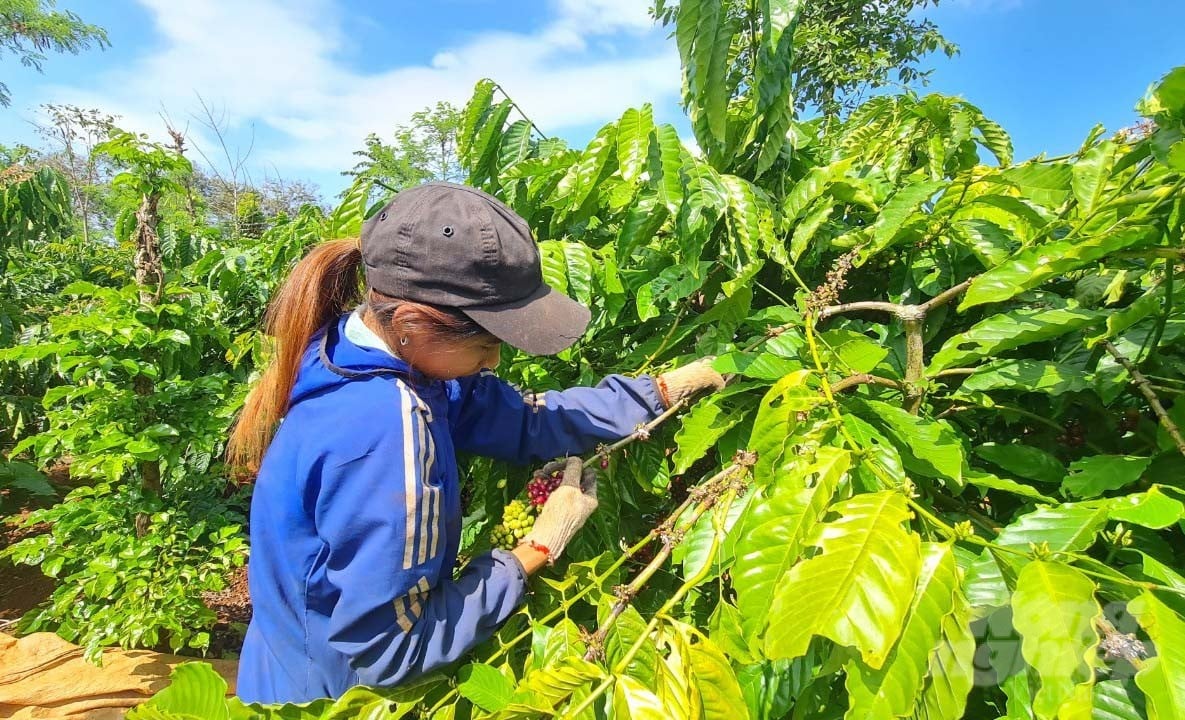
Dak Lak is a locality with more than 200,000 ha of coffee, with a total annual output estimated at about 460,000 tons. Photo: Minh Quy.
According to the Sub-Department of Cultivation and Plant Protection of Dak Lak Province, the locality has more than 200,000 ha of coffee, with a total annual output estimated at about 460,000 tons. Currently, over 10% of the province’s coffee production area is concentrated in specialized farming areas managed by units of the Vietnam National Coffee Corporation, coffee companies in Dak Lak province, and enterprises. The rest, approximately 90%, is grown, cared for, and managed by the farmers themselves.
In recent years, people in Dak Lak have associated with cooperatives and enterprises producing sustainable coffee and specialty coffee, so the methods of care, harvesting, and preservation have also changed a lot. Especially, people have now changed their opinion of harvesting from green picking to picking fruit ripening 90–100% to ensure the quality required by the purchasing unit.
Farmers in Dak Lak are now also focusing on coffee farming according to standards such as 4C (Common Code for the Coffee Community), UTZ Certified, RFA (Rainforest Alliance), and FLO (Fair Trade). The locality’s total area of coffee grown according to the certified sustainable coffee production process reaches about 45,000 ha, accounting for over 22% of the province's coffee area.
In order to improve the quality of coffee comprehensively, every year the agricultural sector of Dak Lak province cooperates with local authorities to strengthen disseminating and mobilizing organizations and individuals to not harvest green coffee. In the case of a late harvest, the percentage of ripe fruit must reach at least 80% to ensure post-harvest quality. Along with that, the Sub-Department of Cultivation and Plant Protection of Dak Lak Province also suggested localities coordinate with functional sectors to both ensure crop protection for farmers and guide harvesting techniques in accordance with regulations.
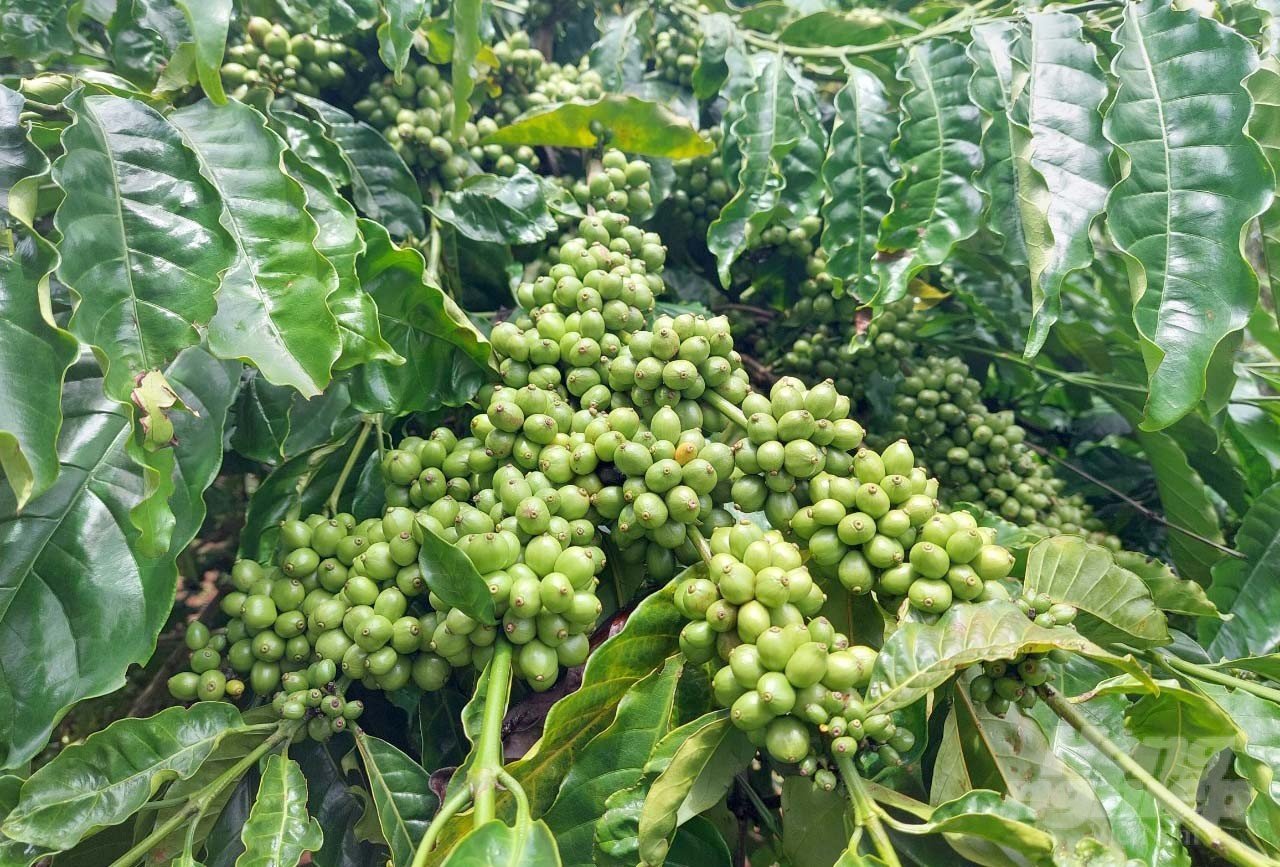
Farmers in Dak Lak are now focusing on cultivating coffee according to standards such as 4C, UTZ Certified, RFA, FLO, etc. to improve product quality. Photo: Minh Quy.
Mr. Nguyen Hac Hien, Deputy Director of the Sub-Department of Cultivation and Plant Protection of Dak Lak Province, said that the Provincial People's Committee has developed a project on sustainable coffee development in the province to 2020 with an orientation to 2030.
In particular, the project's task is to raise the awareness of producers about ensuring the quality of coffee in harvesting, drying, processing, and post-harvest preservation, which is one of the important tasks to promote the sustainable development of the coffee industry in Dak Lak province.
Meanwhile, Lam Dong is the second-largest locality in the country (after Dak Lak) in terms of coffee development. According to the Lam Dong Department of Agriculture and Rural Development, the total area of coffee in the province so far reaches about 176,000 ha, of which Robusta coffee accounts for over 160,000 ha (about 93%) and Arabica coffee accounts for over 12,000 ha (accounting for 7%). The province's Robusta coffee products are mainly exported to European markets such as Germany, Spain, Belgium, and Italy, and Asian markets such as Taiwan, Korea, Japan, and Indonesia. According to statistics, in 2022, the province's export of green coffee reached over 90,000 tons with a value of over USD 175 million.
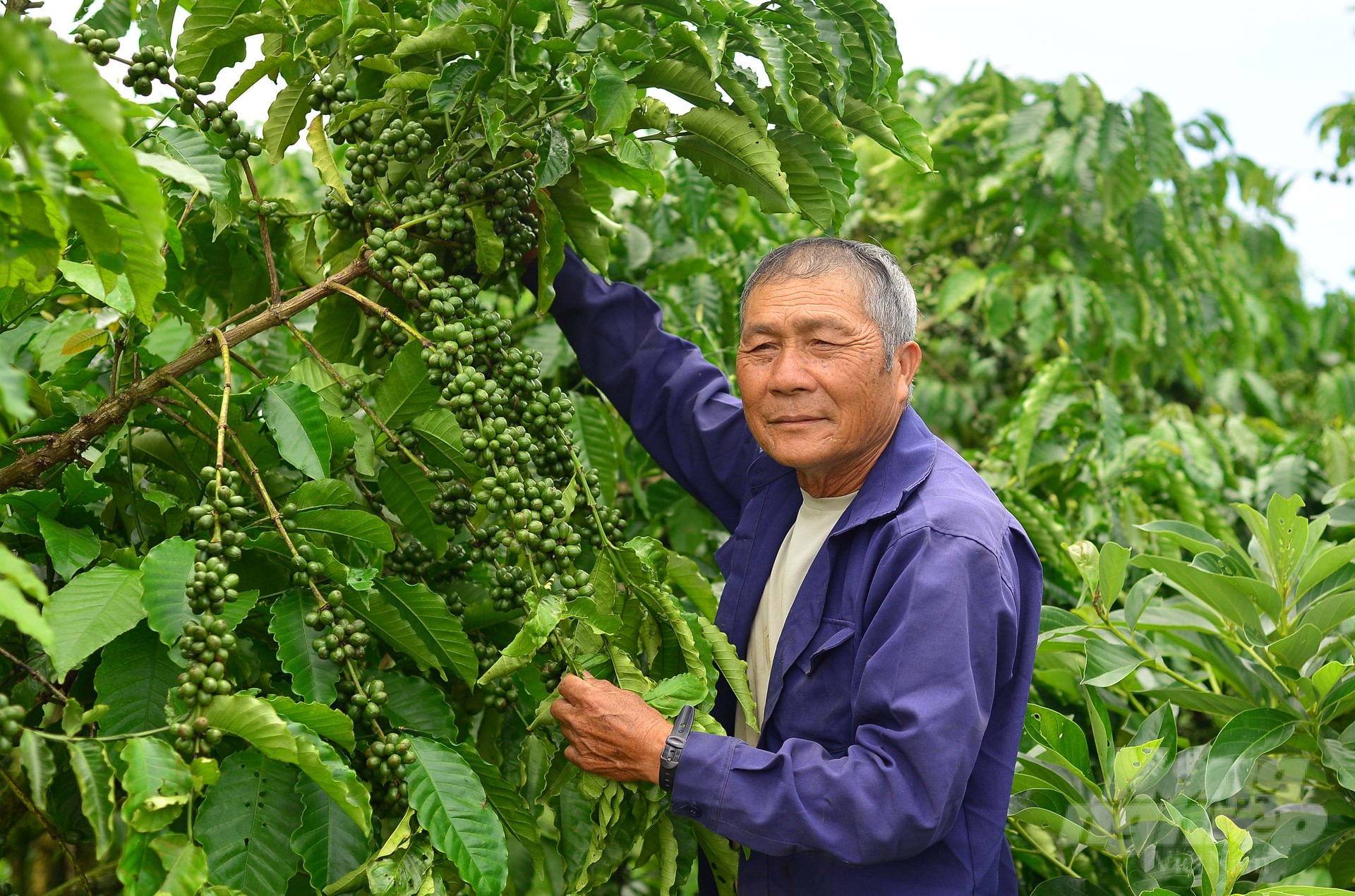
Lam Dong province has focused on building high-tech coffee models with a total scale of approximately 2,000 ha. Photo: Minh Hau.
Determining coffee as one of the key crops, Lam Dong province has implemented many solutions in organizing production and improving yield and output, especially in developing the Robusta coffee industry effectively and meeting domestic and foreign market demand.
According to the Lam Dong Department of Agriculture and Rural Development, in the 2015–2022 period, this province has carried out replanting and grafting to renovate a total of over 77,000 ha. Particularly in 2023, the locality proposed a plan to implement replanting and grafting on an estimated area of over 7,000 ha. According to the assessment, the work of replanting and grafting Robusta coffee seeds has contributed to increasing the province's coffee yield from 2.9 tons of beans/ha in 2015 to 3.3 tons of beans/ha in 2021. Thus, output also increased from 400,000 tons in 2015 to 560,000 tons in 2021.
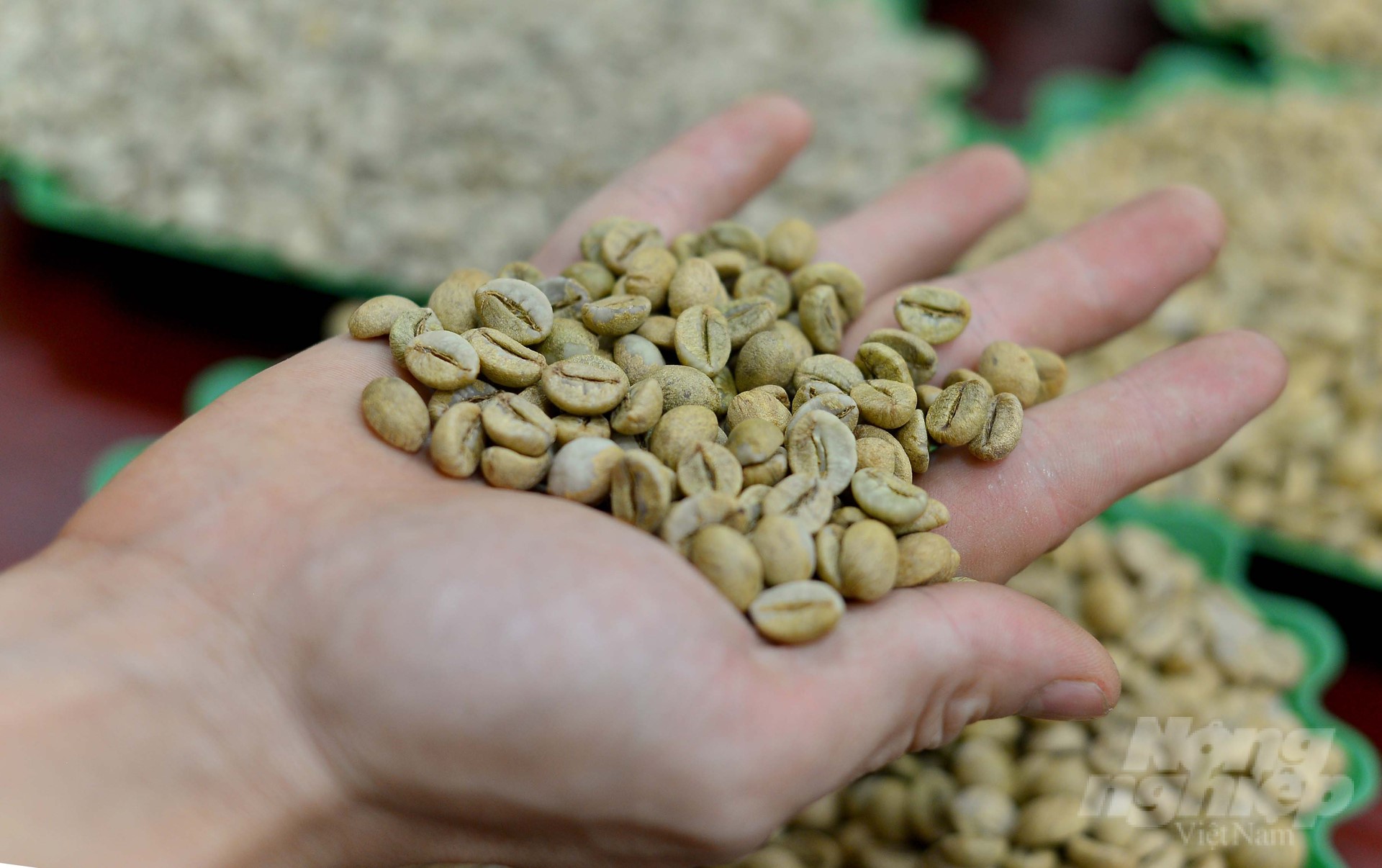
Coffee is one of the key crops in Lam Dong province. Each year, this locality exports about 90,000 tons, with a value of over USD 175 million. Photo: Minh Hau.
As for Robusta coffee seeds in Lam Dong, people and businesses have been applying high-yielding, good-quality, rust-resistant varieties such as TR4, TR9, TR11, TRS1, etc. Besides, some varieties selected by people have high yields and good quality, such as Thien Truong, TS5 (dwarf green), and Huu Thien. Mr. Tran Quang Duy, Deputy Director of the Sub-Department of Cultivation and Plant Protection of Lam Dong Province, said: "Currently, the province has 248 coffee seedling nurseries with a production capacity of over 14 million seedlings and 50 million shoots. This seed source ensures a sufficient annual supply for the new planting and replanting of coffee in the province.
Along with ensuring the source of high-quality Robusta coffee seeds, Lam Dong province also builds a high-tech coffee model. Especially deploying five high-tech Robusta coffee production areas with a scale of approximately 2,000 ha, including 470 ha in Hoa Bac commune (Di Linh district), 370 ha in Dinh Lac commune (Di Linh district), and 900 ha in Lam Ha, Lac Duong, and Bao Lam districts.
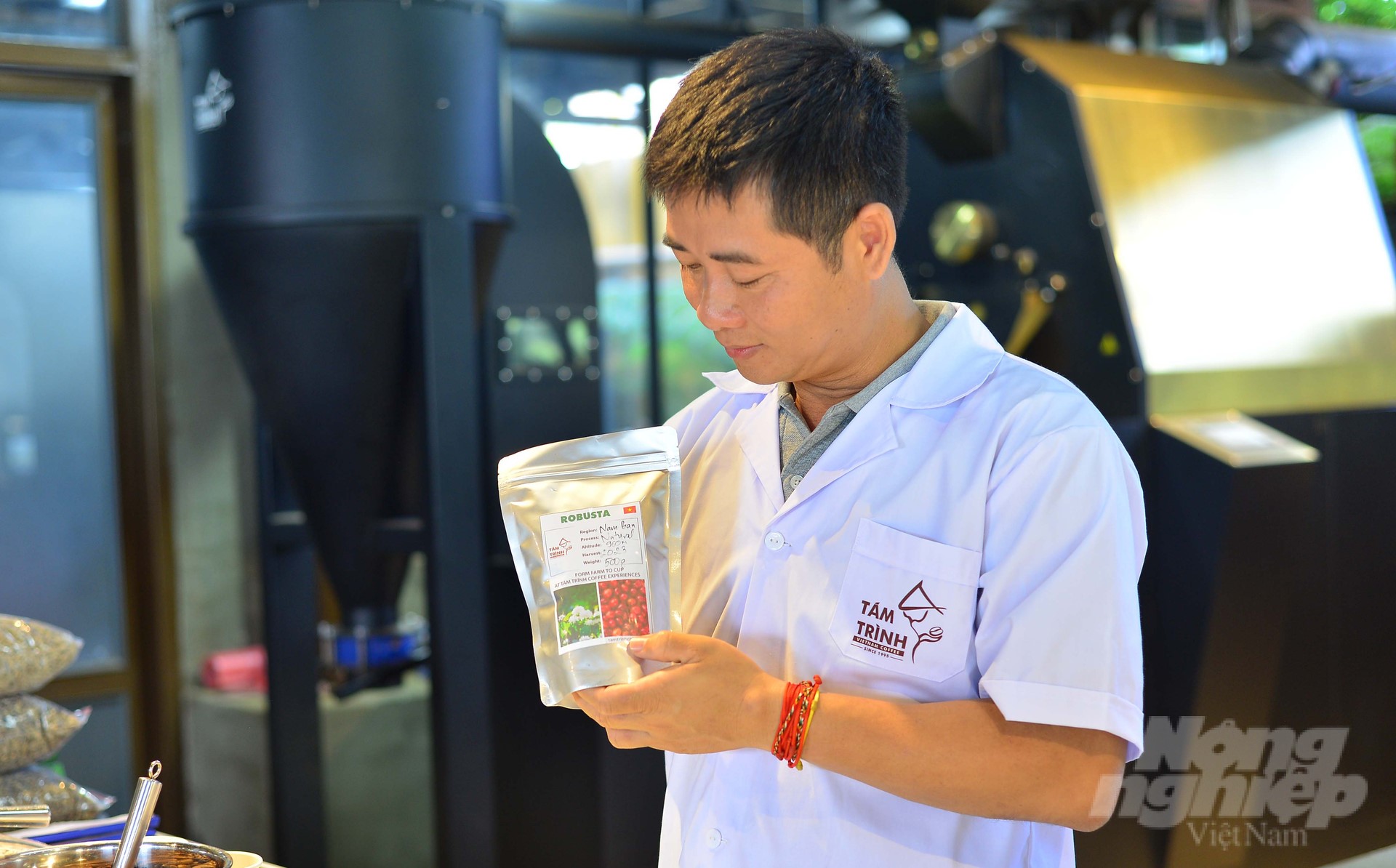
Robusta coffee products from Lam Dong province are mainly exported to European markets such as Germany, Spain, Belgium, and Italy, and Asian markets such as Taiwan, Korea, Japan, and Indonesia. Photo: Minh Hau.
According to the Lam Dong Department of Agriculture and Rural Development, the locality identifies coffee as one of its key crops. Therefore, the province implements a plan of developing stably, keeping an area of 170,000 ha by 2025, of which the area of Robusta coffee is 150,000 ha with a yield of 3.5 tons/ha and a total output of about 550,000 tons.
Mr. Tran Quang Duy, Deputy Director of the Sub-Department of Cultivation and Plant Protection of Lam Dong Province, said that the locality also carried out replanting and grafting coffee with an expected area of 7,500 ha by 2024 and 8,000 ha by 2025.
According to the Dak Lak Department of Industry and Trade, the locality’s coffee export output in 2022 reached 380,000 tons, the highest ever. The coffee export turnover of Dak Lak province reached USD 798 million, accounting for 53% of the province's export turnover.
In 2022, coffee exported in Dak Lak province was mainly green coffee and instant coffee. The average green coffee export price of enterprises in Dak Lak province in the coffee crop year 2021-2022 reached USD 2,000/ton, an increase of USD 363/ton compared to the crop year 2020-2021. Other processed coffee products, such as coffee roasting, coffee powder, etc., have not been exported much.
Dak Lak province has eight enterprises participating in coffee export, including four local enterprises, three FDI enterprises, and one branch of Ho Chi Minh City enterprise located in the province. Daklak September 2nd Import-Export Company Limited continues to be the leading coffee exporter with over 100,000 tons, reaching a turnover of approximately USD 220 million. Regarding export markets, Dak Lak coffee is exported to 64 markets, of which Japan continues to be the largest market.
Translated by Huyen Vu Thu
![Turning wind and rain into action: [4] Bringing climate bulletins to remote and isolated areas](https://t.ex-cdn.com/nongnghiepmoitruong.vn/608w/files/linhnhp/2025/06/14/1152-z6704423696987_15fd32ffc26d590d204d520c9dac6786-nongnghiep-151141.jpg)
(VAN) The Vietnam Agriculture and Nature Newspaper interviewed Mr. Vu Thai Truong, Acting Head of Climate Change and Environment at UNDP Vietnam, to gain deeper insight into how climate bulletins are delivered to farmers.

(VAN) In Tien Giang, a high-tech shrimp farm has developed a distinctive energy-saving farming model that has yielded promising results.
![Turning wind and rain into action: [3] 300.000 farmers benefit from agro-climatic bulletins](https://t.ex-cdn.com/nongnghiepmoitruong.vn/608w/files/news/2025/06/12/e5a48259d6a262fc3bb3-nongnghiep-125122.jpg)
(VAN) The agro-climatic bulletin has become a valuable tool for farmers in the Mekong Delta. After more than five years of implementation, the initiative is gradually being expanded nationwide.
![Turning wind and rain into action: [2] Providing forecasts to the people](https://t.ex-cdn.com/nongnghiepmoitruong.vn/608w/files/news/2025/06/12/e5a48259d6a262fc3bb3-nongnghiep-103927.jpg)
(VAN) In addition to improving the quality of hydrometeorological forecasts, putting forecast bulletins into practical use is crucial for production and disaster prevention.

(VAN) Blue carbon is receiving attention for its rapid absorption capacity and vast potential. It represents a promising nature-based solution to respond to climate change.
/2025/06/11/3507-1-161904_583.jpg)
(VAN) Seagrass beds and coral reefs serve as 'cradles' that nurture life in the ocean depths, creating rich aquatic resources in Vietnamese waters.
![Turning wind and rain into action: [1] Forecasting for farmers](https://t.ex-cdn.com/nongnghiepmoitruong.vn/608w/files/news/2025/06/11/e5a48259d6a262fc3bb3-nongnghiep-111919.jpg)
(VAN) Weather is no longer just a matter of fate. Forecasts have now become an essential companion for farmers in every crop season.